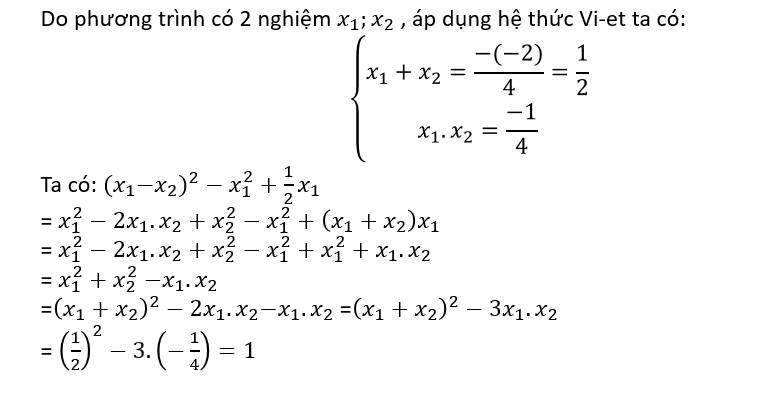
Những câu hỏi liên quan
Giải phương trình sau:
(2x+1)(x2-1)=4x2-2x-2
\(\Leftrightarrow2x^3-2x+x^2-1-4x^2+2x+2=0\)
\(\Leftrightarrow2x^3-3x^2+1=0\)
\(\Leftrightarrow2x^3-2x^2-x^2+1=0\)
\(\Leftrightarrow2x^2\left(x-1\right)-\left(x-1\right)\left(x+1\right)=0\)
\(\Leftrightarrow\left(x-1\right)\left(2x^2-x-1\right)=0\)
\(\Leftrightarrow\left(x-1\right)\left(2x^2-2x+x-1\right)=0\)
\(\Leftrightarrow\left(x-1\right)^2\left(2x+1\right)=0\)
=>x=1 hoặc x=-1/2
Đúng 2
Bình luận (0)
\(\left(2x+1\right)\left(x^2-1\right)=4x^2-2x-2\\ \Leftrightarrow\left(2x+1\right)\left(x-1\right)\left(x+1\right)=4x^2-4x+2x-2\\ \Leftrightarrow\left(2x+1\right)\left(x-1\right)\left(x+1\right)=4x\left(x-1\right)+2\left(x-1\right)\\ \Leftrightarrow\left(2x+1\right)\left(x-1\right)\left(x+1\right)=\left(4x+2\right)\left(x-1\right)\\ \Leftrightarrow\left(2x+1\right)\left(x-1\right)\left(x+1\right)=2\left(2x+1\right)\left(x-1\right)\\ \Leftrightarrow\left(2x+1\right)\left(x-1\right)\left(x+1\right)-2\left(2x+1\right)\left(x-1\right)=0\\ \Leftrightarrow\left(2x+1\right)\left(x-1\right)\left(x+1-2\right)=0\\ \Leftrightarrow\left(2x+1\right)\left(x-1\right)^2=0\\ \Leftrightarrow\left[{}\begin{matrix}x=-\dfrac{1}{2}\\x=1\end{matrix}\right.\)
Đúng 2
Bình luận (0)
Bài 1: Giải các phương trình dưới đây1) x2 - 9 (x - 3)(5x +2)2) x3 - 1 (x - 1)(x2 - 2x +16)3) 4x2 (x - 1) - x + 1 04) x3 + 4x2 - 9x - 36 05) (3x + 5)2 (x - 1)26) 9 (2x + 1)2 4 (x - 5)27) x2 + 2x 158) x4 + 5x3 + 4x2 09) (x2 - 4) - (x - 2)(3 - 2x) 010) (3x + 2)(x2 - 1) (9x2 - 4) (x + 1)11) (3x - 1)(x2 + 2) (3x - 1)(7x - 10)12) (2x2 + 1) (4x - 3) (x - 12)(2x2 + 1)
Đọc tiếp
Bài 1: Giải các phương trình dưới đây
1) x2 - 9 = (x - 3)(5x +2)
2) x3 - 1 = (x - 1)(x2 - 2x +16)
3) 4x2 (x - 1) - x + 1 = 0
4) x3 + 4x2 - 9x - 36 = 0
5) (3x + 5)2 = (x - 1)2
6) 9 (2x + 1)2 = 4 (x - 5)2
7) x2 + 2x = 15
8) x4 + 5x3 + 4x2 = 0
9) (x2 - 4) - (x - 2)(3 - 2x) = 0
10) (3x + 2)(x2 - 1) = (9x2 - 4) (x + 1)
11) (3x - 1)(x2 + 2) = (3x - 1)(7x - 10)
12) (2x2 + 1) (4x - 3) = (x - 12)(2x2 + 1)
1: \(\Leftrightarrow\left(x-3\right)\left(x+3\right)-\left(x-3\right)\left(5x+2\right)=0\)
\(\Leftrightarrow\left(x-3\right)\left(-4x+1\right)=0\)
hay \(x\in\left\{3;\dfrac{1}{4}\right\}\)
2: \(\Leftrightarrow\left(x-1\right)\left(x^2+x+1\right)-\left(x-1\right)\left(x^2-2x+16\right)=0\)
\(\Leftrightarrow\left(x-1\right)\left(x^2+x+1-x^2+2x-16\right)=0\)
\(\Leftrightarrow\left(x-1\right)\left(3x-15\right)=0\)
hay \(x\in\left\{1;5\right\}\)
3: \(\Leftrightarrow\left(x-1\right)\left(4x^2-1\right)=0\)
\(\Leftrightarrow\left(x-1\right)\left(2x-1\right)\left(2x+1\right)=0\)
hay \(x\in\left\{1;\dfrac{1}{2};-\dfrac{1}{2}\right\}\)
4: \(\Leftrightarrow x^2\left(x+4\right)-9\left(x+4\right)=0\)
\(\Leftrightarrow\left(x+4\right)\left(x-3\right)\left(x+3\right)=0\)
hay \(x\in\left\{-4;3;-3\right\}\)
5: \(\Leftrightarrow\left[{}\begin{matrix}3x+5=x-1\\3x+5=1-x\end{matrix}\right.\Leftrightarrow\left[{}\begin{matrix}2x=-6\\4x=-4\end{matrix}\right.\Leftrightarrow\left[{}\begin{matrix}x=-3\\x=-1\end{matrix}\right.\)
6: \(\Leftrightarrow\left(6x+3\right)^2-\left(2x-10\right)^2=0\)
\(\Leftrightarrow\left(6x+3-2x+10\right)\left(6x+3+2x-10\right)=0\)
\(\Leftrightarrow\left(4x+13\right)\left(8x-7\right)=0\)
hay \(x\in\left\{-\dfrac{13}{4};\dfrac{7}{8}\right\}\)
Đúng 1
Bình luận (0)
1.
\(\Leftrightarrow\left(x-3\right)\left(x+3\right)=\left(x-3\right)\left(5x-2\right)\)
\(\Leftrightarrow x+3=5x-2\)
\(\Leftrightarrow4x=5\Leftrightarrow x=\dfrac{5}{4}\)
2.
\(\Leftrightarrow\left(x-1\right)\left(x^2+x+1\right)=\left(x-1\right)\left(x^2-2x+16\right)\)
\(\Leftrightarrow x^2+x+1=x^2-2x+16\)
\(\Leftrightarrow3x=15\Leftrightarrow x=5\)
3.
\(\Leftrightarrow4x^2\left(x-1\right)-\left(x-1\right)=0\)
\(\Leftrightarrow\left(x-1\right)\left(4x^2-1\right)=0\)
\(\Leftrightarrow\left[{}\begin{matrix}x=1\\x=\dfrac{1}{2};x=-\dfrac{1}{2}\end{matrix}\right.\)
Đúng 1
Bình luận (1)
7.
\(\Leftrightarrow x^2+2x-15=0\)
\(\Leftrightarrow\left(x-3\right)\left(x+5\right)=0\)
\(\Leftrightarrow\left[{}\begin{matrix}x=3\\x=-5\end{matrix}\right.\)
8.\(\Leftrightarrow x^4+x^3+4x^3+4x^2=0\)
\(\Leftrightarrow x^3\left(x+1\right)+4x^2\left(x+1\right)=0\)
\(\Leftrightarrow\left(x+1\right)\left(x^3+4x^2\right)=0\)
\(\Leftrightarrow\left[{}\begin{matrix}x=-1\\x=0;x=-4\end{matrix}\right.\)
9.\(\Leftrightarrow\left(x-2\right)\left(x+2\right)=\left(x-2\right)\left(3-2x\right)\)
\(\Leftrightarrow x+2=3-2x\)
\(\Leftrightarrow3x=1\Leftrightarrow x=\dfrac{1}{3}\)
Đúng 1
Bình luận (0)
Xem thêm câu trả lời
cho phương trình 4x2-2x-1=0 có 2 nghiệm x1,x2.Không giải phương trình,tính A=(x1-x2)2 -x12+1/2x1
A=(x1-x2)^2-x1^2+x1(x1+x2)
=(x1-x2)^2+x1x2
=(x1+x2)^2-x1x2
=(1/2)^2-(-1/4)=1/4+1/4=1/2
Đúng 0
Bình luận (0)
Giải phương trình:
20
(
x
-
2
x
+
1
)
2
-
5
(
x
+
2
x
-
1...
Đọc tiếp
Giải phương trình: 20 ( x - 2 x + 1 ) 2 - 5 ( x + 2 x - 1 ) 2 + 48 x 2 - 4 x 2 - 1 = 0 ta được các nghiệm x 1 , x 2 với x 1 < x 2 . Tính 3 x 1 - x 2
A. 25 3
B. -1
C. - 7 3
D. 1
Giải phương trình
a
)
2
x
+
3
x
-
4
2
x
-
1
x
+
2
-
27
b
)
x
2
-
4
-
x
+
5...
Đọc tiếp
Giải phương trình
a ) 2 x + 3 x - 4 = 2 x - 1 x + 2 - 27
b ) x 2 - 4 - x + 5 2 - x = 0
c ) x + 2 x - 2 - x - 2 x + 2 = 4 x 2 - 4
d ) x + 1 x - 1 - x + 2 x + 3 + 4 x 2 + 2 x - 3 = 0
a) 2(x + 3)(x – 4) = (2x – 1)(x + 2) – 27
⇔ 2(x2 – 4x + 3x – 12) = 2x2 + 4x – x – 2 – 27
⇔ 2x2 – 2x – 24 = 2x2 + 3x – 29
⇔ -2x – 3x = 24 – 29
⇔ - 5x = - 5 ⇔ x = -5/-5 ⇔ x = 1
Tập nghiệm của phương trình : S = {1}
b) x2 – 4 – (x + 5)(2 – x) = 0
⇔ x2 – 4 + (x + 5)(x – 2) = 0 ⇔ (x – 2)(x + 2 + x + 5) = 0
⇔ (x – 2)(2x + 7) = 0 ⇔ x – 2 = 0 hoặc 2x + 7 = 0
⇔ x = 2 hoặc x = -7/2
Tập nghiệm của phương trình: S = {2; -7/2 }
c) ĐKXĐ : x – 2 ≠ 0 và x + 2 ≠ 0 (khi đó : x2 – 4 = (x – 2)(x + 2) ≠ 0)
⇔ x ≠ 2 và x ≠ -2
Quy đồng mẫu thức hai vế :

Khử mẫu, ta được : x2 + 4x + 4 – x2 + 4x – 4 = 4
⇔ 8x = 4 ⇔ x = 1/2( thỏa mãn ĐKXĐ)
Tập nghiệm của phương trình : S = {1/2}
d) ĐKXĐ : x – 1 ≠ 0 và x + 3 ≠ 0 (khi đó : x2 + 2x – 3 = (x – 1)(x + 3) ≠ 0)
⇔ x ≠ 1 và x ≠ -3
Quy đồng mẫu thức hai vế :

![]()
Khử mẫu, ta được : x2 + 3x + x + 3 – x2 + x – 2x + 2 + 4 = 0
⇔ 3x = -9 ⇔ x = -3 (không thỏa mãn ĐKXĐ)
Tập nghiệm của phương trình : S = ∅
Đúng 0
Bình luận (0)
\(2\left(x+3\right)\left(x-4\right)=\left(2x-1\right)\left(x+2\right)-27\)
\(< =>2\left(x^2-x-12\right)=2x^2+3x-2-27\)
\(< =>2x^2-2x-24=2x^2+3x-2-27\)
\(< =>5x=-24+29=5\)
\(< =>x=\frac{5}{5}=1\)
\(x^2-4-\left(x+5\right)\left(2-x\right)=0\)
\(< =>\left(x-2\right)\left(x+2\right)+\left(x+5\right)\left(x-2\right)=0\)
\(< =>\left(x-2\right)\left(x+2+x+5\right)=0\)
\(< =>\left(x-2\right)\left(2x+7\right)=0\)
\(< =>\orbr{\begin{cases}x-2=0\\2x+7=0\end{cases}}< =>\orbr{\begin{cases}x=2\\x=-\frac{7}{2}\end{cases}}\)
Xem thêm câu trả lời
cho phương trình 4x2-2x-1=0 có 2 nghiệm x1,x2.Không giải phương trình,tính A=(x1-x2)2- x1-1/2x1
Giup a cam on
Giải các phương trình sau:a)
x
−
1
2
−
2
x
+
5
2
0
;
b)
x
2
−
1
−
x
2...
Đọc tiếp
Giải các phương trình sau:
a) x − 1 2 − 2 x + 5 2 = 0 ;
b) x 2 − 1 − x 2 − 2 x − 1 2 = 0 ;
c) x 3 + 8 = − 2 x x + 2 ;
d) 4 x 2 + 8 x − 5 = 0 .
2. Giải phương trình
(x + 2)(2x - 3) = x2- 4
X2 + 3x +2= 0
2x2 +5x +3 = 0
X3 + x2 - 12x = 0
1.\(\left(x+2\right)\left(2x-3\right)=x^2-4\)
\(\Leftrightarrow\left(x+2\right)\left(2x-3\right)-\left(x+2\right)\left(x-2\right)=0\)
\(\Leftrightarrow\left(x+2\right)\left(2x-3-x+2\right)=0\)
\(\Leftrightarrow\left(x+2\right)\left(x-1\right)=0\)
\(\Leftrightarrow\left[{}\begin{matrix}x=-2\\x=1\end{matrix}\right.\)
2.\(x^2+3x+2=0\)
\(\Leftrightarrow x^2+x+2x+2=0\)
\(\Leftrightarrow x\left(x+1\right)+2\left(x+1\right)=0\)
\(\Leftrightarrow\left(x+1\right)\left(x+2\right)=0\)
\(\Leftrightarrow\left[{}\begin{matrix}x=-1\\x=-2\end{matrix}\right.\)
3.\(2x^2+5x+3=0\)
\(\Leftrightarrow2x^2+2x+3x+3=0\)
\(\Leftrightarrow2x\left(x+1\right)+3\left(x+1\right)=0\)
\(\Leftrightarrow\left(x+1\right)\left(2x+3\right)=0\)
\(\Leftrightarrow\left[{}\begin{matrix}x=-1\\x=-\dfrac{3}{2}\end{matrix}\right.\)
4.\(x^3+x^2-12x=0\)
\(\Leftrightarrow x\left(x^2+x-12\right)=0\)
\(\Leftrightarrow x\left(x+4\right)\left(x-3\right)=0\)
\(\Leftrightarrow\left[{}\begin{matrix}x=0\\x=-4\\x=3\end{matrix}\right.\)
Đúng 2
Bình luận (0)
a: \(\Leftrightarrow\left(x+2\right)\left(2x-3\right)-\left(x+2\right)\left(x-2\right)=0\)
\(\Leftrightarrow\left(x+2\right)\left(2x-3-x+2\right)=0\)
=>(x+2)(x-1)=0
=>x=-2 hoặc x=1
b: =>(x+1)(x+2)=0
=>x=-1 hoặc x=-2
c: =>(2x+3)(x+1)=0
=>x=-1 hoặc x=-3/2
d: =>x(x+4)(x-3)=0
hay \(x\in\left\{0;-4;3\right\}\)
Đúng 1
Bình luận (0)
Giải phương trình1) 2x ( x – 3 ) + 5 ( x – 3 ) 02) ( x2 – 4 ) – ( x – 2 ) ( 3 – 2x ) 03) ( 2x – 1 )2 – ( 2x + 5 )2 114) ( 2x + 1 )2 ( 3x – 5 ) 4x2 – 15) 3x2 – 5x – 8 06) ( 2x + 1 )2 ( 3x – 5 ) 4x2 – 17) 3x2 – 5x – 8 08) left|x-5right|39) left|2x-5right|3-x10) left|2x+1right|left|x-1right|11) dfrac{5x+2}{6}-dfrac{8x-1}{3}dfrac{4x+2}{5}-512) dfrac{3x+2}{2}-dfrac{3x+1}{6}2x+dfrac{5}{3}
Đọc tiếp
Giải phương trình
1) 2x ( x – 3 ) + 5 ( x – 3 ) = 0
2) ( x2 – 4 ) – ( x – 2 ) ( 3 – 2x ) = 0
3) ( 2x – 1 )2 – ( 2x + 5 )2 = 11
4) ( 2x + 1 )2 ( 3x – 5 ) = 4x2 – 1
5) 3x2 – 5x – 8 = 0
6) ( 2x + 1 )2 ( 3x – 5 ) = 4x2 – 1
7) 3x2 – 5x – 8 = 0
8) \(\left|x-5\right|=3\)
9) \(\left|2x-5\right|=3-x\)
10) \(\left|2x+1\right|=\left|x-1\right|\)
11) \(\dfrac{5x+2}{6}-\dfrac{8x-1}{3}=\dfrac{4x+2}{5}-5\)
12) \(\dfrac{3x+2}{2}-\dfrac{3x+1}{6}=2x+\dfrac{5}{3}\)
1) Ta có: \(2x\left(x-3\right)+5\left(x-3\right)=0\)
\(\Leftrightarrow\left(x-3\right)\left(2x+5\right)=0\)
\(\Leftrightarrow\left[{}\begin{matrix}x=3\\x=-\dfrac{5}{2}\end{matrix}\right.\)
2) Ta có: \(\left(x^2-4\right)-\left(x-2\right)\left(3-2x\right)=0\)
\(\Leftrightarrow\left(x-2\right)\left(x+2\right)+\left(x-2\right)\left(2x-3\right)=0\)
\(\Leftrightarrow\left(x-2\right)\left(3x-1\right)=0\)
\(\Leftrightarrow\left[{}\begin{matrix}x=2\\x=\dfrac{1}{3}\end{matrix}\right.\)
3) Ta có: \(\left(2x-1\right)^2-\left(2x+5\right)^2=11\)
\(\Leftrightarrow4x^2-4x-1-4x^2-20x-25=11\)
\(\Leftrightarrow-24x=11+1+25=37\)
hay \(x=-\dfrac{37}{24}\)
Đúng 1
Bình luận (0)
5) Ta có: \(3x^2-5x-8=0\)
\(\Leftrightarrow3x^2+3x-8x-8=0\)
\(\Leftrightarrow3x\left(x+1\right)-8\left(x+1\right)=0\)
\(\Leftrightarrow\left(x+1\right)\left(3x-8\right)=0\)
\(\Leftrightarrow\left[{}\begin{matrix}x=-1\\x=\dfrac{8}{3}\end{matrix}\right.\)
8) Ta có: \(\left|x-5\right|=3\)
\(\Leftrightarrow\left[{}\begin{matrix}x-5=3\\x-5=-3\end{matrix}\right.\Leftrightarrow\left[{}\begin{matrix}x=8\\x=2\end{matrix}\right.\)
10) Ta có: \(\left|2x+1\right|=\left|x-1\right|\)
\(\Leftrightarrow\left[{}\begin{matrix}2x+1=x-1\\2x+1=1-x\end{matrix}\right.\Leftrightarrow\left[{}\begin{matrix}2x-x=-1-1\\2x+x=1-1\end{matrix}\right.\)
\(\Leftrightarrow\left[{}\begin{matrix}x=-2\\x=0\end{matrix}\right.\)
Đúng 1
Bình luận (0)



















